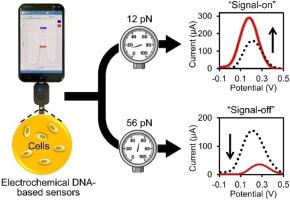当前位置:
X-MOL 学术
›
Anal. Chim. Acta
›
论文详情
Our official English website, www.x-mol.net, welcomes your
feedback! (Note: you will need to create a separate account there.)
A portable and sensitive DNA-based electrochemical sensor for detecting piconewton-scale cellular forces
Analytica Chimica Acta ( IF 5.7 ) Pub Date : 2024-11-04 , DOI: 10.1016/j.aca.2024.343392 Mahmoud Amouzadeh Tabrizi, Ahsan Ausaf Ali, Murali Mohana Rao Singuru, Lan Mi, Priyanka Bhattacharyya, Mingxu You
Analytica Chimica Acta ( IF 5.7 ) Pub Date : 2024-11-04 , DOI: 10.1016/j.aca.2024.343392 Mahmoud Amouzadeh Tabrizi, Ahsan Ausaf Ali, Murali Mohana Rao Singuru, Lan Mi, Priyanka Bhattacharyya, Mingxu You

|
Cell-generated forces are a key player in cell biology, especially during cellular shape formation, migration, cancer development, and immune response. The measurement of forces exerted and experienced by cells is fundamental in understanding these mechanosensitive cellular behaviors. While cell-generated forces can now be detected based on techniques like fluorescence microscopy, atomic force microscopy, optical/magnetic tweezers, however, most of these approaches rely on complicated instruments or materials, as well as skilled operators, which could limit their potential broad applications in regular biological laboratories.
中文翻译:

一种便携式、灵敏的基于 DNA 的电化学传感器,用于检测皮孔顿级细胞力
细胞产生的力是细胞生物学的关键参与者,尤其是在细胞形状形成、迁移、癌症发展和免疫反应过程中。测量细胞施加和承受的力是理解这些机械敏感细胞行为的基础。虽然现在可以基于荧光显微镜、原子力显微镜、光学/磁镊等技术来检测细胞产生的力,但是,这些方法中的大多数都依赖于复杂的仪器或材料,以及熟练的操作员,这可能会限制它们在常规生物实验室中的潜在广泛应用。
更新日期:2024-11-04
中文翻译:

一种便携式、灵敏的基于 DNA 的电化学传感器,用于检测皮孔顿级细胞力
细胞产生的力是细胞生物学的关键参与者,尤其是在细胞形状形成、迁移、癌症发展和免疫反应过程中。测量细胞施加和承受的力是理解这些机械敏感细胞行为的基础。虽然现在可以基于荧光显微镜、原子力显微镜、光学/磁镊等技术来检测细胞产生的力,但是,这些方法中的大多数都依赖于复杂的仪器或材料,以及熟练的操作员,这可能会限制它们在常规生物实验室中的潜在广泛应用。


















































 京公网安备 11010802027423号
京公网安备 11010802027423号